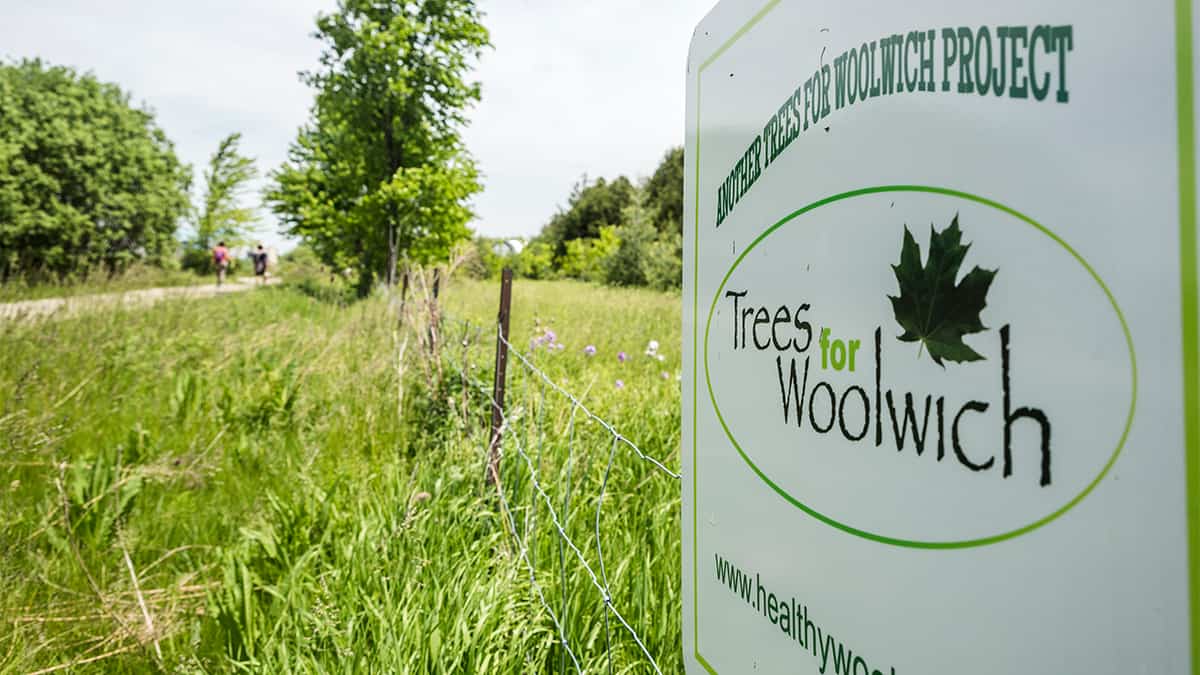It may be mid-November, but Trees for Woolwich already has its sights set on the next planting season. The winter downtime provides time to plan for that.
With that in mind, and in partnership with Nature Guelph, the group launches its Zoom-based “Speaking of Trees” winter learning series November 17 with a presentation by Kyle McLoughlin, a certified master arborist and owner of Ironwood Arboricultural Solutions.
Tree Care in the Urban Environment will focus on the common challenges of growing trees in the urban environment, including what consumers should look for when maintaining their trees and plant health care concerns, protecting trees from construction damage, as well as touching on common soil problems, native species and pests.
Other presentations in the series include From Forester to Forensic Scientist: A Botanist’s Journey to the Dark Side with Gerard Courtin, PhD, botanist and professor emeritus at Laurentian University (January 19); Homeowner Action to Protect Water Quality with Becca Robinson, REEP healthy yards advisor (February 16); Outstanding Shrubs, with Kevin Kavanagh of South Coast Gardens (March 16); Plants of the Tall Grass Prairie presented by Graham Buck (April 20); and The Restoration of the American Chestnut in Ontario, with Ron Casier, chair of the Canadian Chestnut Council (May 18).
It’s the second year for the series, which proved a popular online outlet for people wanting to stay engaged with the topic during winter, said Trees for Woolwich chair Inga Rinne.
“The target audience is really just anyone who’s interested in tree- and nature-related topics. These are designed for a lay audience. Some of them will be just for information on broader topics, others will be practical tips on things that people can actually do,” she explained.
“We ran this series last year in junction with Nature Guelph, which has had a winter speakers series for a number of years,” she added, noting the pandemic prompted a move to an online format that could reach more people. “Lots of people were at home, and to some degree are still at home – suddenly, you can reach a much greater audience on Zoom than you can in person…. So we thought we would offer these over the winter when people are stuck inside anyway, and provide people with some info from people who are experts in the field.”
Arborist Kyle McLoughlin opens the series next Wednesday. He’ll be talking about planting trees in an urban environment, with a focus on species native to the Carolinian zone.
“I find folks get caught in trends,” he said of the choices people make when planting trees on their properties. “Oftentimes, I hear about maples – everybody wants to plant maples, maples all the time. Norway maple, sugar maples, silver maples. What I really want to do is show people that in Ontario we have an amazing biodiversity that we can just pull from. We’ve got species that grow here that grew here long before the Europeans [came]. But when the Europeans arrived, they either removed them or just didn’t cultivate them because they were unfamiliar.”
Today, we should be making better use of hardier native species, he suggests.
“There are benefits to those trees, as far as they’re resistant to certain types of fungi, or their ability to symbiotically interact with other fungi that are native here.”
One of his favourites is the ironwood tree, which is slow-growing and remains a manageable size.
“I feel like it’s a very Canadian tree. It’s rugged. It’s attractive,” said McLoughlin. “It’s not the most beautiful tree in the forest, but it’s very resilient. We don’t see it a lot of yards, and I personally like it as a yard tree – as a backyard tree, as a front yard tree – because you can do a lot with an ironwood.
“I’m really big right now on sassafras as well, which is another native Carolinian tree that is really under planted. It’s edible. It’s got edible properties to its roots, and its leaves can be eaten right off the tree – they taste like fruit loops, not an exaggeration. It’s actually what root beer used to be flavoured with. It’s a native tree, and it grows in our forests, but it’s very rarely planted.”









